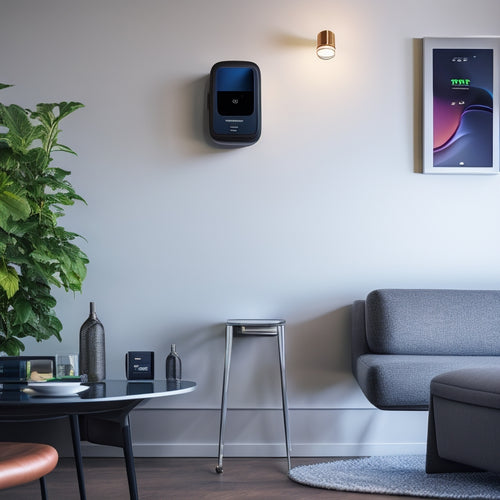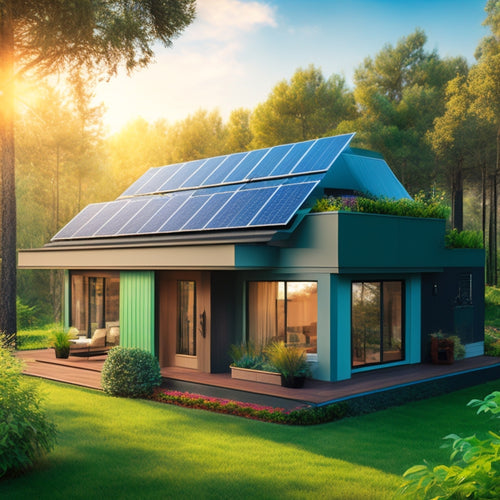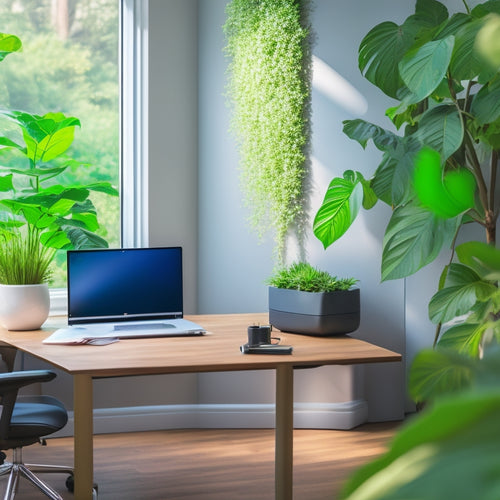
Revolutionize Your Lawn: Water-Wise Tech for Homeowners
Share
You're likely pouring a significant amount of your water budget into outdoor usage, but water-wise technologies can change your lawn's health while conserving this precious resource. Smart irrigation controllers, weather-based watering systems, and soil moisture sensor technology work together to optimize water distribution, ensuring your lawn receives the right amount of water at the right time. Real-time water usage tracking and leak detection alerts help you stay on top of consumption and identify potential issues. By embracing these innovations, you'll not only save water but also gain a deeper understanding of your lawn's unique needs, and revealing a wealth of new possibilities for a lush, resilient outdoor space awaits.
Key Takeaways
- Optimize water distribution with smart irrigation controllers that monitor soil moisture, temperature, and humidity for a lush, healthy lawn.
- Utilize weather-based watering systems that adjust schedules according to real-time weather data, ensuring lawns receive the right amount of water at the right time.
- Implement water conservation strategies like rain sensor technology and real-time water usage tracking to achieve significant water savings and reduce stormwater runoff.
- Leverage leak detection and management systems with smart sensors to pinpoint exact locations of leaks and minimize waste and damage through proactive leak management.
- Automate lawn watering schedules with smart home integration, enabling remote control, real-time weather updates, and automated adjustments based on soil moisture levels for efficiency.
Smart Irrigation Controllers Explained
How do you guarantee your lawn and garden receive the right amount of water without wasting a single drop? Smart irrigation controllers are the answer.
These innovative devices optimize water distribution by monitoring soil moisture, temperature, and humidity levels. By adjusting irrigation schedules accordingly, you'll enjoy smart irrigation benefits like reduced water consumption and a lush, healthy environment.
With the growing trend of renewable energy sources powering homes and businesses, it's crucial to conserve water and reduce our carbon footprint. Eco-friendly gardening has never been easier!
With a smart irrigation controller, you'll have complete control over your watering schedule, ensuring your plants receive exactly what they need, when they need it. Say goodbye to overwatering and hello to a more sustainable, water-efficient way of caring for your outdoor area.
Weather-Based Watering Systems
As you optimize your irrigation schedule with smart controllers, you can take it a step further by integrating weather-based watering systems.
These systems utilize real-time weather data to adjust your irrigation schedule, ensuring your lawn receives the right amount of water at the right time. By tapping into local weather stations or satellite feeds, weather-based systems can detect changes in temperature, humidity, and precipitation, automatically adjusting your irrigation schedule to match.
Furthermore, just like Land Acquisition and site preparation costs depend on location and zoning regulations, weather-based watering systems also consider the local climate and topography to optimize water usage.
Soil Moisture Sensor Technology
With soil moisture sensor technology, you're taking water conservation to the next level by directly measuring the moisture levels in your soil. This allows you to optimize your irrigation schedule, ensuring your lawn receives the right amount of water at the right time. By doing so, you're promoting soil health and moisture retention, which leads to a stronger, more resilient lawn.
| Sensor Type | Accuracy | Response Time |
|---|---|---|
| Tensiometers | ±0.1 kPa | 1-2 minutes |
| Resistive Sensors | ±5% | 1-5 minutes |
| Capacitance Sensors | ±2% | 10-30 seconds |
| Time Domain Sensors | ±1% | 1-10 seconds |
Leak Detection and Alerts
You can install smart sensors that continuously monitor your home's water system, detecting even the slightest anomalies in pressure, flow, and temperature.
These sensors can pinpoint the exact location of a leak, ensuring you take targeted action to prevent further damage.
By incorporating renewable energy solutions into your home's infrastructure, you can reduce your carbon footprint and lower your energy bills.
With real-time leak notification, you'll receive alerts on your phone or tablet the moment a leak is detected, allowing you to respond quickly and minimize waste.
Smart Sensors Monitoring
Frequently, homeowners overlook the silent threat of water leaks, which can cause extensive damage and waste precious resources.
By integrating fast charging infrastructure solar-powered charging into their smart gardening systems, they can reduce their carbon footprint and energy costs.
Smart sensors monitoring is the solution you need to take control of your lawn's water usage. By installing these devices, you'll receive real-time data on soil health, moisture retention, and water usage, enabling you to make informed decisions about irrigation efficiency.
This technology helps you optimize plant health, reduce environmental impact, and enjoy the freedom of smart gardening.
With user-friendly interfaces and advanced data analytics, you can make seasonal adjustments to your watering schedule, ensuring your lawn receives the right amount of water at the right time.
Real-Time Leak Notification
How quickly can you respond to a hidden water leak in your home? Real-time leak notification systems enable you to take swift action, minimizing damage and waste.
These advanced systems employ AI-powered sensors and machine learning algorithms to detect anomalies in water usage patterns, identifying potential leaks before they become major issues.
As you shift to renewable energy solutions, such as solar panels with high efficiency ratings, you'll want to guarantee your plumbing infrastructure is optimized for energy efficiency as well.
Receive instant alerts via mobile app or email, allowing you to respond promptly and take control.
By integrating real-time leak notification into your leak prevention strategies, you'll stay ahead of hidden water losses and optimize your plumbing maintenance tips.
Enjoy peace of mind, knowing your home is protected from the unexpected, and your water bill is under control.
Water Conservation Strategies
You're probably aware that a significant portion of your water bill comes from outdoor usage, such as irrigation and landscaping.
To optimize your water consumption, you can implement water conservation strategies like rain sensor technology, which automatically adjusts irrigation schedules based on precipitation.
Rain Sensor Technology
Efficiency converges with innovation in rain sensor technology, a state-of-the-art solution for water-conscious homeowners.
You can utilize the power of rain sensors to optimize your irrigation system, ensuring you're not watering your lawn when Mother Nature has already done the job.
Rain sensor benefits include significant water savings, reduced stormwater runoff, and a lower water bill.
During rain sensor installation, a wireless sensor is placed in an open area to detect rainfall, and it communicates with your irrigation controller to adjust watering schedules accordingly.
This advanced technology gives you the freedom to enjoy a lush, green lawn while conserving this precious resource.
Drought-Tolerant Landscaping
As you optimize your irrigation system with rain sensors, it's equally important to contemplate the type of horticulture that will thrive in harmony with this water-wise technology.
By incorporating native plants and drought-resistant varieties, you'll create a sustainable garden that requires minimal upkeep.
Apply xeriscaping principles to your horticultural design, selecting plants that are adapted to local climate conditions.
Use eco-friendly materials and prioritize soil health to create a thriving ecosystem.
When selecting plants, consider factors like growth rate, mature size, and sun exposure to guarantee a cohesive garden aesthetic.
Smart Irrigation Systems
By integrating smart irrigation systems into your water-wise tech arsenal, homeowners can optimize their water usage and reduce waste.
These systems use advanced sensors and weather data to guarantee your lawn receives the perfect amount of water. You can control your irrigation system remotely through an app, receiving alerts and recommendations for improvement.
Conduct regular water audits to identify areas of inefficiency and implement conservation tips, such as using drip irrigation and selecting native plants that require less water.
Adjust your irrigation schedule seasonally to accommodate changing weather patterns, and use site design principles to maximize efficiency.
Track your progress against efficiency benchmarks and stay on top of irrigation maintenance to make certain your system runs smoothly.
Optimizing Lawn Watering Schedules
Your lawn's irrigation system is only as good as its schedule, and a poorly planned watering routine can lead to overwatering, underwatering, or worse - wasted water. Optimizing your lawn watering schedule is essential for effective lawn care. You need to take into account seasonal adjustments, drought conditions, and plant types to determine the ideal watering frequency. Different soil types also require varying irrigation methods.
| Season | Watering Frequency | Soil Type |
|---|---|---|
| Spring | Every 3-4 days | Clay, Loam |
| Summer | Every 2-3 days | Sand, Loam |
| Fall | Every 4-5 days | Clay, Sand |
| Winter | Every 6-7 days | All soil types |
Real-Time Water Usage Tracking
Nearly 60% of a homeowner's water bill is attributed to outdoor water usage, with a significant portion of that going towards lawn irrigation.
With real-time water usage tracking, you'll have a clear depiction of your lawn's water consumption. This technology provides water usage analytics, enabling you to make informed decisions about your irrigation schedule.
Here's what you can expect from real-time water usage tracking:
-
Instant alerts: Receive notifications when water usage exceeds expected levels, indicating potential leaks or overwatering.
-
Detailed reports: Access daily, weekly, and monthly water usage reports to identify trends and opportunities for optimization.
-
Customizable thresholds: Set water usage limits and receive alerts when they're exceeded, ensuring you stay within your budget.
- Remote monitoring: View your water usage data from anywhere, at any time, giving you the freedom to manage your lawn's water consumption on your own terms.
Automated Rain Delay Features
You can take your water conservation efforts to the next level with automated rain delay features, which employ rainfall monitoring systems to detect precipitation and adjust your irrigation schedule accordingly.
These systems can be integrated with smart watering schedules, ensuring your lawn and garden only receive the water they need, when they need it.
Rainfall Monitoring Systems
Sophisticated rainfall monitoring systems are now enabling homeowners to optimize their water usage by automatically delaying irrigation schedules during rainfall events.
These advanced systems employ rain gauge technology to collect precipitation data, ensuring your lawn receives the right amount of water.
With real-time monitoring, you can:
- Receive alerts when rainfall reaches a certain threshold, triggering an automatic delay in your irrigation schedule.
- View historical precipitation data to identify trends and adjust your watering schedule accordingly.
- Integrate with your existing irrigation system, allowing for seamless communication and control.
- Enjoy peace of mind knowing your lawn is being watered efficiently, reducing waste and conserving this precious resource.
Smart Watering Schedules
By integrating rainfall data with automated irrigation schedules, homeowners can optimize water usage through smart watering schedules that adjust to real-time precipitation conditions.
You'll never overwater again, as these schedules automatically delay or skip irrigation sessions when it's raining. This guarantees your lawn receives the right amount of water, reducing waste and conserving this precious resource.
When you do need to water, smart schedules can optimize your drip irrigation system to deliver water directly to the roots, promoting healthy growth and reducing evaporation.
Additionally, they can account for soil moisture retention, adjusting water application rates based on soil type and climate.
With smart watering schedules, you'll enjoy a lush, lively lawn while minimizing your water footprint.
Lawn Watering Efficiency Metrics
Your lawn's water usage is an essential aspect of maintaining a water-wise home, and understanding lawn watering efficiency metrics is key to optimizing this usage.
By tracking these metrics, you'll be able to make data-driven decisions to improve your lawn's health and reduce water waste.
Here are four key lawn watering efficiency metrics to monitor:
- Water Application Rate: The rate at which water is applied to your lawn, measured in inches per hour.
- Water Distribution Uniformity: The evenness of water distribution across your lawn, measured as a percentage.
- Lawn Water Absorption Rate: The rate at which your lawn absorbs water, measured in minutes.
- Watering Frequency and Duration: The frequency and duration of watering sessions, measured in days and minutes respectively.
Integrating With Smart Home Systems
As you investigate the world of water-wise tech, integrating your lawn watering system with smart home systems can take your water conservation efforts to the next level.
With smart home integration, you can seamlessly connect your lawn watering system to your existing smart home setup, enabling automated lawn management. This allows you to control and monitor your lawn watering schedule remotely, receive real-time weather updates, and even automate adjustments based on soil moisture levels.
By integrating your lawn watering system with smart home systems, you'll enjoy enhanced water efficiency, reduced waste, and a healthier, more resilient lawn.
Plus, you'll have the freedom to manage your lawn from anywhere, at any time.
Frequently Asked Questions
Can I Install Water-Wise Tech Myself or Do I Need a Pro?
You can opt for DIY installation, but consider consulting a pro for complex systems; they'll assess your lawn's unique needs, ensuring a precise, efficient setup that maximizes water savings and freedom from maintenance woes.
Are Water-Wise Lawn Systems Compatible With My Existing Irrigation System?
You'll likely need a pro to assess your existing irrigation system's compatibility with water-wise tech, considering factors like pipe size, flow rate, and control systems, to determine required system upgrades for seamless integration and ideal performance.
How Do I Know Which Water-Wise Tech Is Best for My Lawn Type?
As you commence on a quest for the perfect lawn, regard it as finding the Holy Grail - it requires a thorough lawn assessment. You'll need to evaluate factors like soil moisture levels, climate, and grass type to determine which water-wise tech is the best fit for your lawn's unique needs.
Will Water-Wise Tech Increase My Home's Value at Resale?
When you invest in water-wise tech, you'll likely enhance your home's value at resale, as it appeals to eco-conscious buyers and reduces water consumption, increasing your property's desirability and resale benefits.
Are There Any Rebates or Incentives for Installing Water-Wise Tech?
You're literally showered with opportunities! Yes, you'll find a plethora of rebates and incentives for installing water-wise tech, leveraging government incentives and maximizing water conservation benefits, ultimately saving you a pretty penny and granting you the freedom to enjoy a guilt-free lawn!
Related Posts
-

7 Best EV Battery Health Trackers for Homeowners
You can maximize your electric vehicle's performance and lifespan by leveraging advanced battery health trackers that...
-

3 Green HVAC Filters for Solar-Powered Homes
When outfitting your solar-powered home with an HVAC system, you'll want to choose filters that align with your commi...
-

10 Best Energy-Efficient External Hard Drives for Sustainable Offices
When it comes to sustainable offices, you need external hard drives that balance data storage needs with energy effic...


